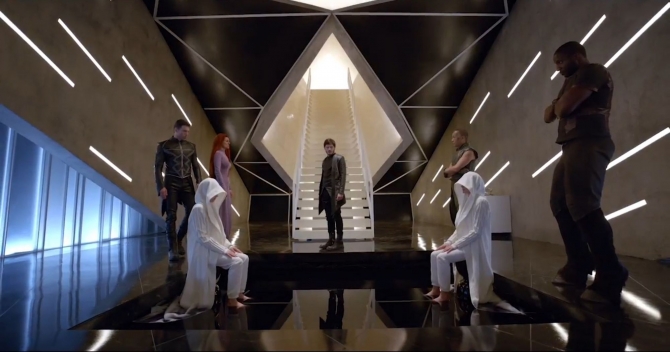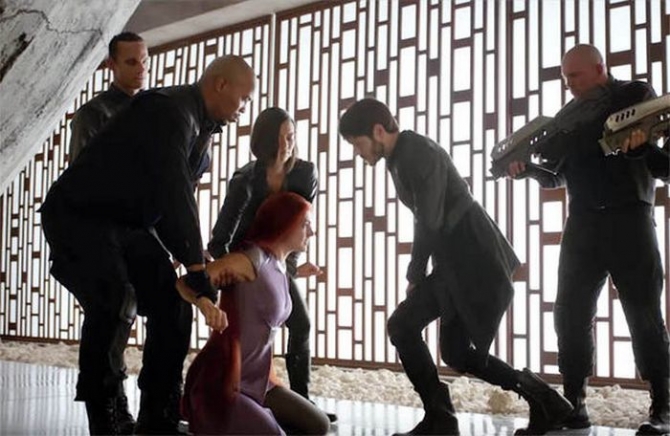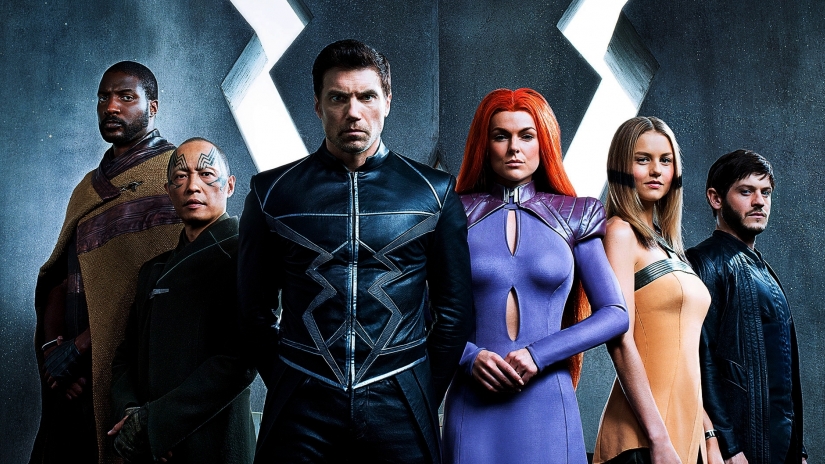Inhumans, a new series from Marvel Television, has taken a strange path to the public: a shortened version of the first two episodes in the series arrived on the 1st of September for a limited run in IMAX theaters around the US, before the show premiered on ABC (which, like Marvel, is owned by Disney) on September the 29th for an eight episode stretch. The saga of the Inhumans in the Marvel Comics universe is decades-long and twisty, as most long-running comic book creations are; but their history on the large and small screen, while shorter, is equally complicated.
To keep it brief: the Inhumans were originally slated to debut in the Marvel Cinematic Universe in their own feature film, initially scheduled for 2018 then pushed to 2019. A script was written (by Joe Robert Cole) but nothing else seemed to happen after that — until Marvel’s flagship TV series, Agents Of S.H.I.E.L.D., introduced the Inhumans at the end of Season 2, making them a major part of the show for the next two years. But while the show stuck largely to their origins as humans who had been genetically enhanced via ancient experiments by the alien Kree, it also focused on a mostly new or obscure set of Inhuman characters and not the Royal Family — who reign over the Inhumans’ secret city of Attilan — that were the focus of most of their history in the comics.
Nevertheless, it was assumed by fans, although never confirmed, that the use of the Inhumans on AoS was a way to introduce the concept into the larger universe and pave the way for the feature film, which would focus on the Royal Family… except that never really happened. And somewhere along the line, Marvel Studios (the feature film division) and Marvel TV had a parting of the ways that was rumoured to be less than amiable, involving an alleged power struggle between studio head Kevin Feige and overall Marvel chairman Ike Perlmutter. That feud ended essentially with Feige having sole control of the movie unit and Perlmutter in command of TV and publishing. But I would venture to guess that there were a few tradeoffs made as well, and one of those tradeoffs was the use of the Inhumans.

So here we are today, with a new Inhumans property trying in its own weird way to straddle both the movie and TV spectrums. The new show does star the Royal Family, bringing characters like Inhumans king Black Bolt (Anson Mount) his queen Medusa (Serinda Swan), adviser Karnak (Ken Leung), military leader Gorgon (Eme Ikwuakor), aquatic being Triton (Mike Moh), Medusa’s sister Crystal (Isabelle Cornish) and Black Bolt’s treacherous brother Maximus (Iwan Rheon) — not to mention Crystal’s giant, teleporting dog Lockjaw — to life on the screen for the first time. But sadly, having seen the IMAX version of the first two episodes, Inhumans already feels like a missed opportunity and an odd outcast in the larger Marvel canon.
I won’t go in-depth into the show at this point, because the version I saw, which ran about 75 minutes, felt strangely truncated. I’m not sure why it was thought that two different versions were necessary, but the one screening in IMAX theaters feels too long for a TV programme but too brief for a movie. Yet perhaps the most damaging aspect of screening the show in IMAX is that the large-screen format utterly emphasises just what a discount production this is. Even if it was shot with IMAX cameras, director Roel Reine does nothing with them to make the show look extraordinary or cinematic. In fact, Inhumans looks quite cheap, as low-budget as the Marvel Netflix shows, and the overly-lit, bland compositions and settings make it look like it popped fresh out of a time machine from the 1980s or 1990s.
At a time when shows like Game Of Thrones (which this would love to emulate, even down to the casting of Westeros veteran Rheon) try to bring an epic sweep to television, Inhumans feels and looks small. It’s not helped by a cast that varies in quality. Rheon perhaps comes off best as the diabolical Maximus, but make no mistake: he doesn’t get to offer anything near the complexity of the MCU’s Loki, the villain to whom he perhaps bears the most similarity in terms of motivation and goals. Mount has the most difficult job because his character doesn’t talk, but the actor ends up merely mugging for the camera. The experienced Leung manages to retain his dignity as well, but some of the others, Ikwuakor and Swan in particular, just aren’t good.

The script throws us into the main storyline — Maximus usurps the throne from Black Bolt, with the Royal Family ending up scattered across Hawaii in various shopworn fish-out-of-water situations — with barely any set-up or time to get to know the characters or their rich, strange history. On this aspect of the show, I’ll punt for now; perhaps the longer version we’ll see on TV will flesh out the structure better before diving into the intrigue that the IMAX version doesn’t give us a chance or reason to care about. But somehow I doubt it. With showrunner Scott Buck somehow failing upwards after his disastrous stint on Iron Fist, it may be too late for the Inhumans to save themselves.
And that’s a shame. The Inhumans were at one point speculated to be the Marvel Cinematic Universe’s ostensible replacement for the X-Men, to which Fox seems dedicated to retaining the rights forever. And it made sense — after all, Inhumans are more or less mutants without actually saying the word. But whether it was the result of an in-house power struggle or a poorly developed premise, Inhumans is likely to end up being one of Marvel’s few outright failures of the past decade (it’s also, at least in the version I saw, not connected in any way to the MCU or even AoS, perhaps on purpose).
A perfect metaphor for the show is the saga of Medusa’s hair, which she can move, control and wield as a weapon. Early footage of her CG-enhanced locks looked ridiculous, and it’s not all that great in the finished version either. The show’s solution is to shave Medusa’s hair off in the first thirty minutes of the premiere episode (not a spoiler), robbing her of her trademark feature and taking a cheap way out. I couldn’t help thinking: what would Kevin Feige and the filmmakers of the MCU do with this? Sadly, it’s very likely we’ll never know.

